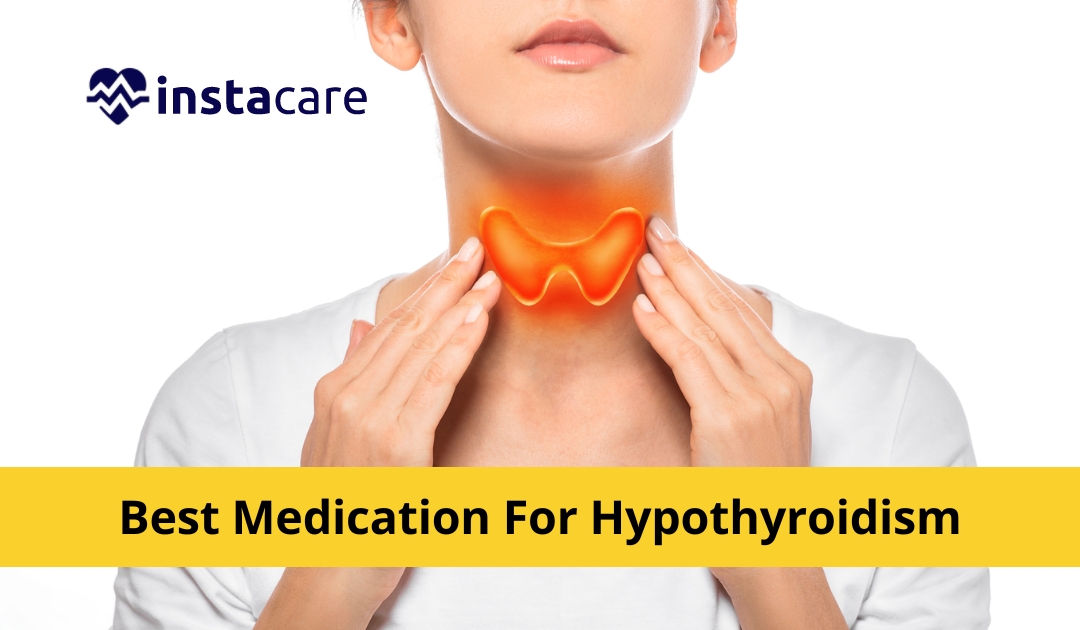Hypothyroidism is indeed a common endocrine disorder characterized by an underactive thyroid gland, resulting in reduced production of thyroid hormones. It affects millions of individuals worldwide and can surely lead to various symptoms, including fatigue, weight gain, depression, and cognitive impairment. Fortunately, hypothyroidism is highly manageable with appropriate treatment, primarily through medications. This guide will explore the best medications available for hypothyroidism, highlighting their mechanisms of action, benefits, potential side effects, and considerations for their use.
1- Levothyroxine (Synthetic Thyroid Hormone)
Levothyroxine, indeed a synthetic form of the thyroid hormone thyroxine (T4), is the most commonly prescribed medication for hypothyroidism. It works by replacing or supplementing insufficient thyroid hormone levels. Levothyroxine offers several advantages, including:
- Effectiveness: Levothyroxine is highly effective in
restoring normal thyroid hormone levels, improving symptoms, and normalizing
metabolic processes.
- Stability: The medication provides consistent hormone levels
due to its long half-life, allowing for once-daily dosing.
- Individualization: Levothyroxine dosages can be adjusted to
indeed meet the specific needs also of each patient based on age, weight,
severity of hypothyroidism, and other individual factors.
- Compatibility: Levothyroxine is well-tolerated and can be safely used with other medications.
2- Liothyronine (Synthetic Triiodothyronine)
Another hypothyroidism drug is liothyronine, a synthetic version of the thyroid hormone triiodothyronine (T3). It has a speedier onset of action than levothyroxine and is less usually given. Some of the most important factors to consider when using liothyronine are:
- Rapid Action: Liothyronine acts quickly and can relieve
symptoms more rapidly than levothyroxine.
- Specific Cases: Liothyronine may benefit individuals who do
not convert T4 to T3 effectively or those who experience persistent symptoms
despite optimal levothyroxine treatment.
- Shorter Half-life: Due to its shorter half-life, liothyronine may require more frequent dosing, which can be challenging for some patients.
Combination Therapy
Combination therapy involves levothyroxine and liothyronine to provide T4 and T3 hormones. While controversial and not widely recommended as a first-line treatment, combination therapy may be considered in certain cases, including:
- Persistent Symptoms: Individuals with ongoing symptoms
despite levothyroxine treatment alone may benefit from the addition of
liothyronine.
- Individual Response: Some patients may prefer combination
therapy and report improved well-being and symptom control.
- Trial Period: Combination therapy can be attempted for a defined trial period under close medical supervision to assess its effectiveness.
Considerations And Side Effects
It is important to consider certain factors and potential side effects associated with hypothyroidism medications:
- Absorption: Levothyroxine absorption can be affected by
various factors such as food, supplements, and certain medications,
necessitating careful timing and considerations.
- Individual Response: Optimal dosages vary among individuals,
and periodic monitoring of thyroid function is essential to ensure proper
hormone replacement.
- Side Effects: While generally well-tolerated, medications
for hypothyroidism can indeed cause side effects, such as hair loss, heart
palpitations, and gastrointestinal disturbances. Side effects are usually a
sign of incorrect dosage.
- Pregnancy Considerations: Pregnant women with hypothyroidism require special attention, as adequate thyroid hormone levels are crucial for fetal development. Medication dosage adjustments are often necessary during pregnancy.
Alternative Medications And Natural Thyroid Extracts
In addition to levothyroxine and liothyronine, alternative medications and natural thyroid extracts can be used for hypothyroidism treatment. These include:
Desiccated Thyroid Extract
Derived from porcine or bovine thyroid glands, desiccated thyroid extract combines T4 and T3 hormones. While it was commonly used before the introduction of synthetic thyroid hormones, its use has become less widespread due to challenges in standardization, dosage consistency, and potential allergenicity.
Thyroid Hormone Analogues
Various thyroid hormone analogs have been developed to provide alternative options for individuals who do not respond well to levothyroxine. These analogs aim to mimic the natural production of thyroid hormones more closely.
Individualized Treatment Approach
Hypothyroidism treatment requires an individualized approach, considering age, underlying health conditions, medication interactions, and patient preferences. Key considerations include:
Starting Dosage
Treatment usually begins with a low dose of levothyroxine, gradually increasing to the optimal dosage based on the patient's response and thyroid hormone levels.
Periodic Monitoring
Regular monitoring of thyroid hormone levels, typically through blood tests, is necessary to assess the effectiveness of the medication and ensure proper dosing. Adjustments may be made based on the results.
Conclusion
The best medication for hypothyroidism depends on individual factors, including the severity of the condition, patient preferences, and the healthcare provider's expertise. Levothyroxine remains the standard treatment due to its effectiveness and stability. Ongoing research may lead to further advancements in hypothyroidism management in the future.

